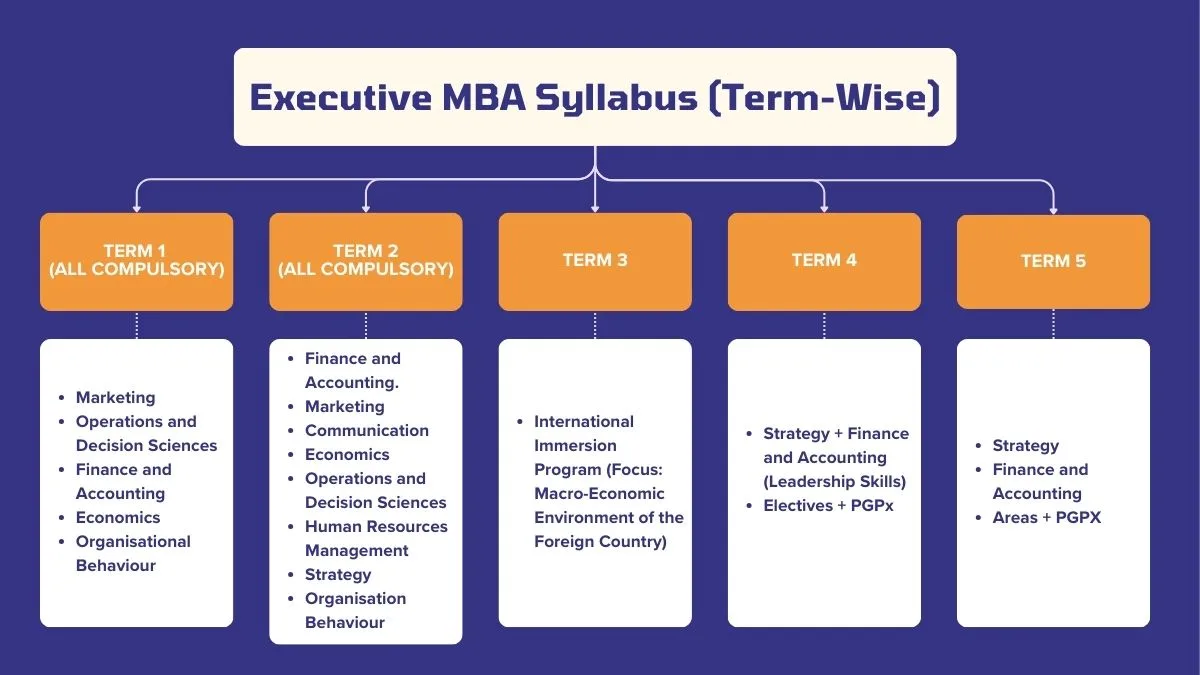Executive MBA Syllabus
These EMBA programs have modules on Business Analytics, Digital Transformation and Innovation that prepare executives for rapid business changes. Leadership and Soft Skills form important parts of this with communications, negotiation and decision-making skills. The courses also focus on Corporate Governance, Business Ethics and Sustainability as relevant to the present-day business context.
Electives focus on topics such as International Business, Entrepreneurship, Supply Chain Management, Artificial Intelligence or IT Management and thus they are a career aspiration tool. Programs generally conclude with either a Capstone Project or a Strategic Management course in which students use their knowledge to solve complex business problems.
The curriculum is set to suit the busy schedule of executives; usually classes are held over the weekends or online sessions are conducted in a modular format to ensure a flexible yet rigorous learning experience.
To suit the busy schedule of working professionals, the Executive MBA program is offered in online/distance and part-time education. This helps students who cannot be present daily on camps. However, for people who are not working, a full-time EMBA is always an option. The top Executive MBA colleges in India that offer advanced management and leadership skills to working executives are IIM Ahmedabad, IIM Bangalore, IIM Calcutta, IIM Lucknow, FMS Delhi, Xavier School of Management, ISB Hyderabad etc.
What is an Executive MBA?
An Executive MBA or EMBA is an MBA program for working professionals, executives and managers who want to develop leadership skills, business knowledge and opportunities without interrupting their careers. An EMBA program is designed differently from a traditional MBA as it is geared towards working professionals, often with flexible schedules like classes on weekends, in the evenings, full-time residential programs or through online modules.
An EMBA covers core business disciplines such as finance, marketing, strategy and operations and advanced topics such as leadership, innovation and global business trends. The experiential uses case studies, real-world projects and global exposure to help participants apply what they learn in the classroom to their organisations.
Executive MBA Program Highlights
The Executive MBA (EMBA) program is designed for working professionals to enhance their leadership and management skills. It is a 1-3 year program with flexible schedules like regular, weekend or modular formats. Eligibility includes graduation, 3-5 years of experience and exams like GMAT, XAT, CAT etc. Fees range from ₹2.32 - ₹42.00 Lakhs with average packages of ₹10.00 - ₹55.00 Lakhs per annum, making it a strong career booster.

Executive MBA Syllabus (Term-Wise)
The following table outlines subjects that are covered in Executive MBA programs. The curriculum covers topics like Financial and Accounting, Marketing and Organisational Behavior etc. It is a working professional program that helps them to face tough management challenges of senior roles, focus on strategies and push organisations to new heights. The table given below will give the candidates a general idea of which subjects are covered in each term at IIM Ahmedabad.
Note: Given above is the 1-year Executive MBA syllabus of IIM Ahmedabad. The syllabus of other IIMs and MBA colleges in India may vary. So the aspirants must visit their desired colleges’ official websites for more information.
Executive MBA Specialisations
Specialisation in an EMBA program is a critical choice that may shape an aspirant's career and future opportunities. It allows professionals to focus on areas of business that may include finance, marketing, operations or leadership. This ensures the program aligns with the professional’s career goals and interests. This targeted approach helps individuals build advanced skills and knowledge in their chosen domain, making them experts and more valuable to their organisations.
Moreover, it can open doors to senior roles, industry shifts or entrepreneurial ventures. Specialisations also enhance networking opportunities by connecting professionals with peers and mentors in their field of interest, further aiding career growth. Ultimately, choosing the right specialisation makes EMBA a tailored experience according to the candidate's aspirations, providing the expertise and confidence needed to excel in a competitive and dynamic business environment.
Some of the popular Executive MBA specialisations are Executive MBA in Operation Management, Human Resource Management (HRM), Finance, Marketing, International Business, Supply Chain Management, Healthcare Management, Entrepreneurship, Information Technology etc. These are explained in detail below:
EMBA in Finance: It focuses more on advanced subjects like investment analysis, corporate finance and risk management. It helps professional people make strategic financial decisions, work in the banking or investment sector, or manage finances for organisations. The Syllabus will include Modern Business Organisation and Management, Accounting and Financial Management and Human Resource and Organisational Behavior.
EMBA in Information Technology: This deals with topics like hospitality security, e-commerce and human resource management. It combines management skills with a strong emphasis on IT. The Information Technology EMBA syllabus will include Business Analytics & Valuation, IT Sales Management and Project Management.
EMBA in Operations and Supply Chain: Suited for production, retail and logistics roles. It is good for efficient production or inventory and a nicely run supply chain.
EMBA in Entrepreneurship: This program provides skills and connections required for becoming an innovative entrepreneur or founder.
EMBA in Marketing: Consumer behaviour, branding, digital marketing and sales strategies. Ideal for marketers who lead marketing teams or design impactful campaigns. The students are taught Strategic Marketing Management, Consumer Behavior and Fundamentals of Advertising.
EMBA in Retail: Good for those passionate about sales, marketing, branding and customer segments.
EMBA in Business Analytics: Combines business principles with data analytics, teaching professionals to solve challenges using a data-driven approach.
EMBA in Human Resource Management: It focuses on managing people including recruitment, training and employee relations. It is ideal for those aspiring for leadership roles in HR. EMBA in HRM syllabus will teach topics such as Business Communication Skills, Human Resource Management and Global Business Environment and Economics.
Executive MBA Specialisations: Future Trends
The future of EMBA specialisations seems bright because industries are continuously evolving and require highly skilled professionals with specialised expertise. As new challenges such as digital transformation, globalisation and sustainability arise in a business, EMBA graduates match these emerging trends.
The popularity of specialisations in Business Analytics, Digital Transformation and Artificial Intelligence is likely to increase because companies are becoming more data-driven and innovative in their technologies. Other areas such as Sustainability and Healthcare Management are also emerging as critical because organisations are now taking environmental responsibility seriously and responding to changes in global health systems.
Finance, marketing, and human resource management remain relevant, but their curriculums would be modernised with tools and methodologies such as fintech applications in finance or digital marketing strategies in branding. International business and operations management would also be expanding as it reflects the interconnectivity of global markets and the need for efficient supply chain solutions.
Hence, EMBA specialisations will continue to offer customised learning experiences that prepare professionals to lead in dynamic competitive environments. These programs will focus on equipping leaders with the skills to address industry-specific challenges, foster innovation and drive long-term success for the organisations.
Top Executive MBA Colleges In India
Mentioned below are the top Executive MBA (EMBA) colleges in India offering programs for experienced professionals looking for improvement through increased leadership and management capabilities. These institutions offer a range of programs such as PGPX, EPGP and MBAEx which generally last 1-2 years. Admission often requires competitive examinations like GMAT, GRE, CAT or institutional tests.
The fees for such programs vary between ₹2.32 Lakhs at FMS Delhi to ₹41.78 Lakhs at the Indian School of Business (ISB), Hyderabad. Graduates of these programs normally earn impressive packages with average figures ranging from ₹4.07 Lakhs per annum at Xavier School of Management’s EDHRM program to ₹54.8 Lakhs per annum for IIM Ahmedabad's PGPX graduates. All these institutions have something unique to offer such as international immersion, flexible learning modes and strong alumni networks which are highly sought after by working professionals.
Popular Entrance Exam for Executive MBA
For those aspiring to pursue an Executive MBA, various entrance exams are essential for admission to top programs. These exams check an aspirant's aptitude and readiness for advanced management studies. Popular exams include GMAT and GRE which are recognised globally and focus on reasoning, analytical and verbal skills.
There are national-level entrance exams accepted in India that test the candidate's quantitative reasoning, verbal skills, decision-making and logical analysis skills, among others. These are namely CAT, XAT and EMAT. Every test has its exam structure and time duration; thus, a student must opt for one test according to their preparation level and target institute.
FAQs
The target audience and structure of an Executive MBA (EMBA) and a Regular MBA are not the same. A Regular MBA is meant for fresh graduates or early career professionals and offers full-time rigorous learning over 2 years. An EMBA on the other hand, is designed for experienced working professionals who have 5+ years of experience. These programs are usually delivered in flexible formats like weekends, evenings or modular classes to balance work and study. EMBA programs focus more on leadership and advanced management skills, while Regular MBA programs provide a broader foundation in business education.
India as a country has many executive MBA colleges but the top five colleges for the program are IIM Ahmedabad, IIM Bangalore, ISB Hyderabad, IIM Calcutta, IIM Indore and IIM Lucknow.
Some of the popular Executive MBA (EMBA) specialisations are EMBA in Human Resource Management, EMBA in Finance, EMBA in Information Technology, EMBA in Supply Chain Management and EMBA in Marketing.
An Executive MBA is similar to a regular MBA program except that the EMBA course is mainly suitable for working people, particularly chief officers, managers or business owners who want to expand their career horizons or switch to a new career.








